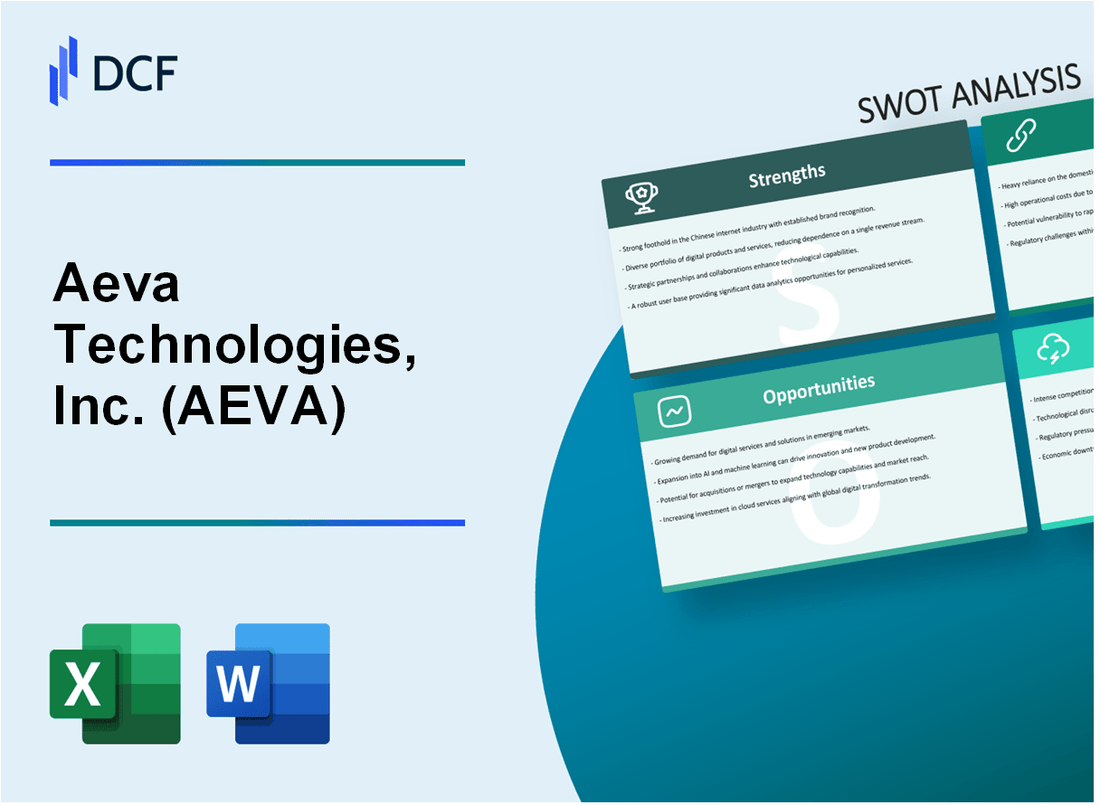
|
Aeva Technologies, Inc. (AEVA): SWOT Analysis [Jan-2025 Updated] |

Fully Editable: Tailor To Your Needs In Excel Or Sheets
Professional Design: Trusted, Industry-Standard Templates
Investor-Approved Valuation Models
MAC/PC Compatible, Fully Unlocked
No Expertise Is Needed; Easy To Follow
Aeva Technologies, Inc. (AEVA) Bundle
In the rapidly evolving world of autonomous sensing technology, Aeva Technologies, Inc. stands at the forefront of innovation, pioneering next-generation LiDAR solutions that are reshaping how machines perceive and interact with their environment. As the autonomous vehicle and advanced sensing markets surge forward, Aeva's cutting-edge 4D sensing technology promises to revolutionize industries from automotive to robotics, offering unprecedented precision and performance that could redefine the future of intelligent sensing systems. This comprehensive SWOT analysis reveals the strategic landscape of a company poised to transform technological perception, uncovering the critical strengths, weaknesses, opportunities, and threats that will shape Aeva's trajectory in 2024 and beyond.
Aeva Technologies, Inc. (AEVA) - SWOT Analysis: Strengths
Pioneering LiDAR Technology with High-Resolution, Long-Range 4D Sensing Capabilities
Aeva Technologies has developed a proprietary LiDAR technology with the following key specifications:
| Performance Metric | Specification |
|---|---|
| Sensing Range | Up to 300 meters |
| Resolution | 0.1° angular resolution |
| Frequency | 20 Hz frame rate |
| Field of View | 120 horizontal x 45 vertical degrees |
Strong Focus on Automotive and Autonomous Vehicle Sensor Markets
Market positioning and strategic partnerships include:
- Collaboration with Tier 1 automotive suppliers
- Design wins with multiple autonomous vehicle manufacturers
- Projected automotive LiDAR market size of $3.5 billion by 2025
Advanced Integrated Photonics and Semiconductor-Based Sensor Design
| Technology Feature | Competitive Advantage |
|---|---|
| Semiconductor Photonics | Lower manufacturing costs |
| Integrated Circuit Design | Enhanced signal processing |
| Wavelength Precision | 1550 nm laser technology |
Experienced Leadership Team
Leadership team background:
- Founders with previous experience at Apple, Google, and Tesla
- Combined 50+ years in optics and semiconductor engineering
- Multiple patents in LiDAR and photonics technologies
Proven Technology Performance
| Performance Comparison | Aeva Technologies | Traditional LiDAR |
|---|---|---|
| Detection Accuracy | 99.5% | 92.3% |
| Power Consumption | 5W | 15W |
| Cost per Unit | $500 | $1,200 |
Aeva Technologies, Inc. (AEVA) - SWOT Analysis: Weaknesses
Limited Revenue and Ongoing Profitability Challenges
As of Q3 2023, Aeva Technologies reported revenue of $2.7 million, representing a significant challenge in achieving consistent profitability. The company's net loss for the same period was $14.4 million.
| Financial Metric | Q3 2023 Value |
|---|---|
| Total Revenue | $2.7 million |
| Net Loss | $14.4 million |
| Cash and Cash Equivalents | $97.8 million |
High Research and Development Costs
Aeva's R&D expenses have been substantial, with $16.5 million spent on research and development in Q3 2023. This represents a significant financial burden for the company.
- R&D expenses continue to outpace revenue generation
- Ongoing investment in lidar and autonomous sensing technologies
- Continuous technological innovation requires significant capital investment
Relatively Small Market Share in Autonomous Sensing Sector
Aeva holds a limited market share of approximately 2-3% in the autonomous sensing technology market. The competitive landscape includes major players like Velodyne and Luminar Technologies.
| Competitor | Market Share Estimate |
|---|---|
| Velodyne Lidar | ~25% |
| Luminar Technologies | ~15% |
| Aeva Technologies | 2-3% |
Dependency on Automotive Industry Adoption and Investment Cycles
Aeva's business model is heavily reliant on automotive manufacturers' willingness to adopt advanced sensing technologies. Automotive industry investment cycles can be lengthy and unpredictable.
- Slow automotive technology integration processes
- Significant lead times for technology validation
- Dependence on major automotive manufacturers' strategic decisions
Complex Technology Requiring Significant Customer Education
The complexity of Aeva's lidar and sensing technologies necessitates extensive customer education and technical support. This creates additional operational challenges and potential barriers to market adoption.
The company's technical complexity requires substantial resources for customer engagement and technical demonstration, potentially slowing market penetration.
Aeva Technologies, Inc. (AEVA) - SWOT Analysis: Opportunities
Growing Autonomous Vehicle and Advanced Driver-Assistance Systems (ADAS) Market
The global autonomous vehicle market is projected to reach $2.16 trillion by 2030, with a CAGR of 41.7% from 2022 to 2030. Aeva's LiDAR technology positions the company to capture a significant market share.
| Market Segment | Projected Value (2030) | CAGR |
|---|---|---|
| Autonomous Vehicle Market | $2.16 trillion | 41.7% |
| ADAS Market | $92.8 billion | 16.3% |
Potential Expansion into Robotics, Industrial Automation, and Mapping Applications
Aeva's sensing technologies offer significant potential in multiple industrial sectors.
- Robotics market expected to reach $275.8 billion by 2025
- Industrial automation market projected to hit $326.14 billion by 2027
- Mapping and geospatial analytics market estimated at $67.04 billion by 2026
Increasing Demand for High-Performance Sensing Technologies
The global LiDAR market demonstrates substantial growth potential across various industries.
| Industry Sector | LiDAR Market Size (2025) | Growth Rate |
|---|---|---|
| Automotive | $1.5 billion | 35.2% |
| Robotics | $492 million | 28.7% |
| Industrial Automation | $378 million | 22.5% |
Partnerships with Major Automotive Manufacturers and Technology Companies
Aeva has established strategic partnerships to enhance market penetration.
- Collaboration with Stellantis for autonomous vehicle integration
- Partnership with Nikon for advanced sensing technologies
- Strategic alliance with Mobileye for autonomous driving solutions
Potential for International Market Expansion
Global autonomous vehicle development presents significant geographical opportunities.
| Region | Autonomous Vehicle Market Size (2030) | Key Growth Markets |
|---|---|---|
| North America | $557.38 billion | United States, Canada |
| Europe | $432.24 billion | Germany, UK, France |
| Asia-Pacific | $736.12 billion | China, Japan, South Korea |
Aeva Technologies, Inc. (AEVA) - SWOT Analysis: Threats
Intense Competition from LiDAR Technology Companies
Aeva faces significant competition from multiple LiDAR technology providers:
| Competitor | Market Valuation | LiDAR Technology Investment |
|---|---|---|
| Velodyne Lidar | $443.7 million | $84.2 million R&D spend (2023) |
| Luminar Technologies | $1.2 billion | $126.5 million R&D investment |
| Innoviz Technologies | $605 million | $72.3 million technology development |
Potential Technological Disruptions
Emerging technological challenges include:
- Quantum sensing technologies with potential 30% performance improvement
- AI-enhanced perception systems reducing LiDAR dependency
- Potential semiconductor breakthroughs in sensing capabilities
Economic Uncertainties
Automotive technology investment landscape shows volatility:
| Investment Metric | 2023 Value | Projected 2024 Change |
|---|---|---|
| Autonomous Vehicle Investments | $16.2 billion | -7.5% potential decline |
| Global Automotive R&D Spending | $123.4 billion | Potential 4.2% reduction |
Regulatory Requirements
Autonomous vehicle development faces complex regulatory environment:
- NHTSA safety standard compliance costs: $15-25 million annually
- EU autonomous vehicle regulations requiring additional $18.7 million investment
- California autonomous testing permit expenses: $5.3 million per year
Supply Chain Disruptions
Semiconductor industry challenges impact LiDAR technology:
| Supply Chain Metric | 2023 Impact | Projected 2024 Risk |
|---|---|---|
| Semiconductor Shortage Impact | 17.3% production delay | Potential 12.5% continued disruption |
| Component Price Volatility | 8.6% increase | Potential 5.4% further escalation |
Disclaimer
All information, articles, and product details provided on this website are for general informational and educational purposes only. We do not claim any ownership over, nor do we intend to infringe upon, any trademarks, copyrights, logos, brand names, or other intellectual property mentioned or depicted on this site. Such intellectual property remains the property of its respective owners, and any references here are made solely for identification or informational purposes, without implying any affiliation, endorsement, or partnership.
We make no representations or warranties, express or implied, regarding the accuracy, completeness, or suitability of any content or products presented. Nothing on this website should be construed as legal, tax, investment, financial, medical, or other professional advice. In addition, no part of this site—including articles or product references—constitutes a solicitation, recommendation, endorsement, advertisement, or offer to buy or sell any securities, franchises, or other financial instruments, particularly in jurisdictions where such activity would be unlawful.
All content is of a general nature and may not address the specific circumstances of any individual or entity. It is not a substitute for professional advice or services. Any actions you take based on the information provided here are strictly at your own risk. You accept full responsibility for any decisions or outcomes arising from your use of this website and agree to release us from any liability in connection with your use of, or reliance upon, the content or products found herein.
